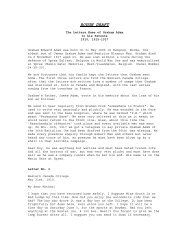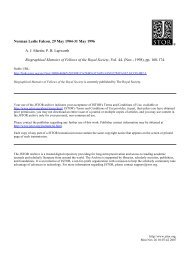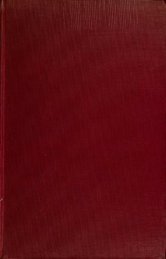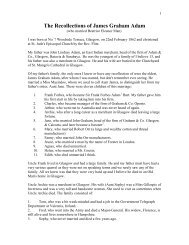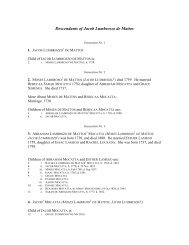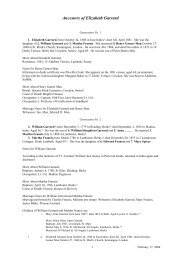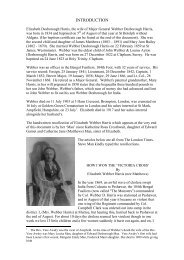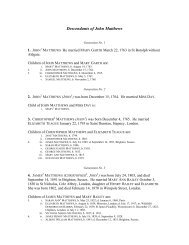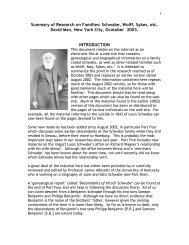Richard Craddock's Career with the East India Company - Man Family
Richard Craddock's Career with the East India Company - Man Family
Richard Craddock's Career with the East India Company - Man Family
Create successful ePaper yourself
Turn your PDF publications into a flip-book with our unique Google optimized e-Paper software.
18<br />
1656<br />
In March 1656 <strong>the</strong> <strong>East</strong> <strong>India</strong> <strong>Company</strong> in London experienced<br />
one of its occasional economic downturns ‘… <strong>the</strong> large<br />
quantities of <strong>East</strong> <strong>India</strong> commodities which are arrived in<br />
to England have much declined in value’ (EFI 55-60 p. 61).<br />
This crisis prompted a letter to be sent out to Surat on<br />
<strong>the</strong> 27th of that month ordering <strong>the</strong> closure of all <strong>the</strong><br />
company’s factories except <strong>the</strong> one at Surat and <strong>the</strong><br />
dismissal of all <strong>the</strong> company’s factors except a handful who<br />
were to remain at Surat v . Among those who were slated for<br />
dismissal was <strong>Richard</strong> Craddock although this was dependent<br />
on any of those who had been retained not being available<br />
in which case Craddock was to replace that person. However<br />
if all those who were asked to stay could stay <strong>the</strong>n<br />
Craddock was not to be kept on in expectation of a vacancy.<br />
Indeed, all those who were dismissed, including Craddock,<br />
were to return to London at <strong>the</strong>ir own expense or were to be<br />
‘absolutely discharged and dismissed’. (EFI 55-60, p. 60)<br />
Long before <strong>the</strong> above letter was received (when), Craddock<br />
had already decided to quit Ahmadabad which he did on<br />
February 25 1656. He did so because <strong>the</strong> Ahmadabad factory<br />
was experiencing one of <strong>the</strong> cyclical downtowns in <strong>the</strong> price<br />
of indigo and it was no longer economically viable to<br />
continue <strong>the</strong>re. Unfortunately he did not get far. Barring<br />
his way was a mob of indignant indigo makers who insisted<br />
that before Craddock left Ahmadabad he was to personally<br />
weigh <strong>the</strong> Indigo that he intended to send after him. What<br />
sparked <strong>the</strong> indigo makers suspicion we can ga<strong>the</strong>r from<br />
Craddock’s letter:<br />
Not<strong>with</strong>standing I told <strong>the</strong>m that <strong>the</strong> brokers, after my<br />
departure, would have order to weigh it, yet <strong>the</strong>y were not<br />
content <strong>the</strong>re<strong>with</strong>, saying that, while <strong>the</strong>re was an<br />
Englishman here, <strong>the</strong>re was some hope, but if I went, <strong>the</strong>y<br />
<strong>the</strong>n knew not what to trust to. (Letter from Craddock, EFI<br />
55-60, p. 74)<br />
As a result Craddock was forced to write to Surat for<br />
permission to remain at Ahmadabad until <strong>the</strong> indigo was<br />
weighed and packed. As a matter of fact he did not quit <strong>the</strong><br />
city until <strong>the</strong> middle of June 1656, when he was relieved by<br />
Anthony Smith, whose principal business on behalf of <strong>the</strong><br />
company was to recover debts. [see <strong>the</strong> letter from<br />
Ahmadabad to Surat 18 June 1656 – (J 124) in Factory<br />
Records, Surat Vol. 103]



